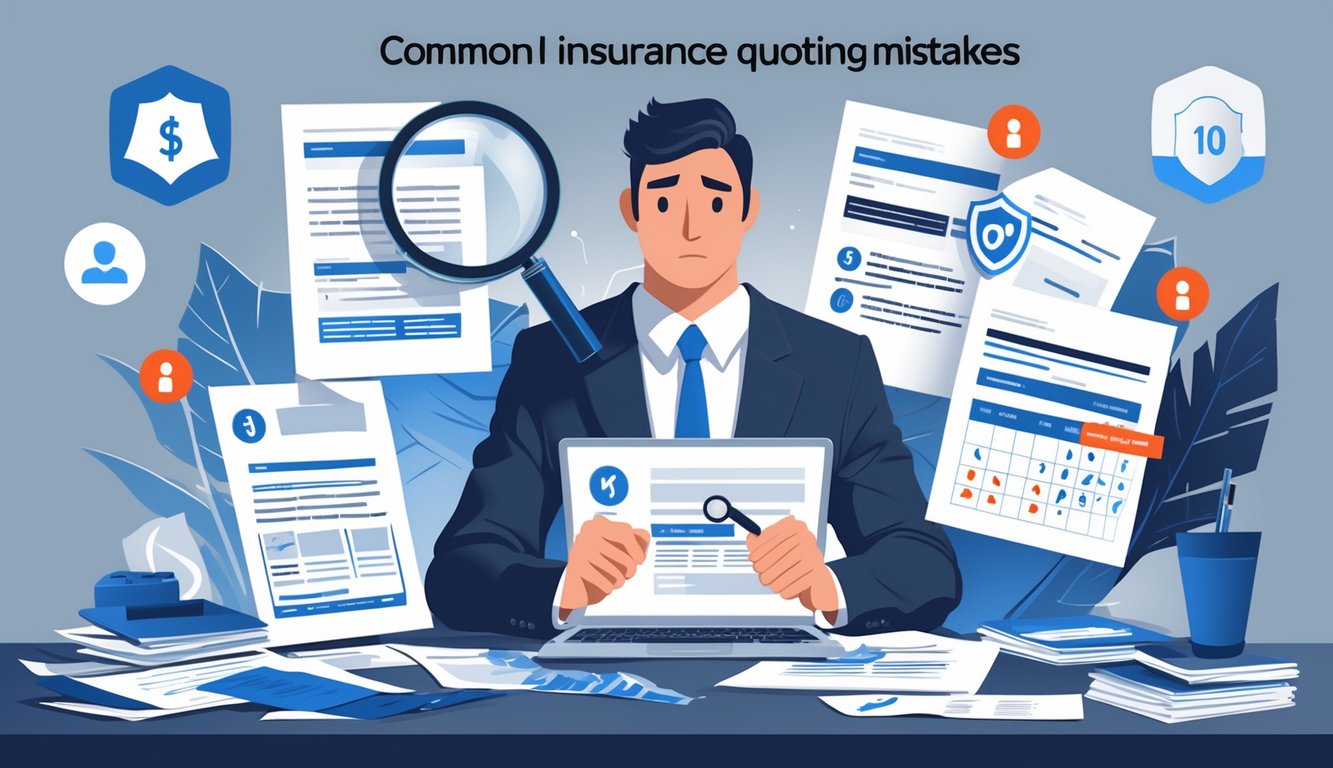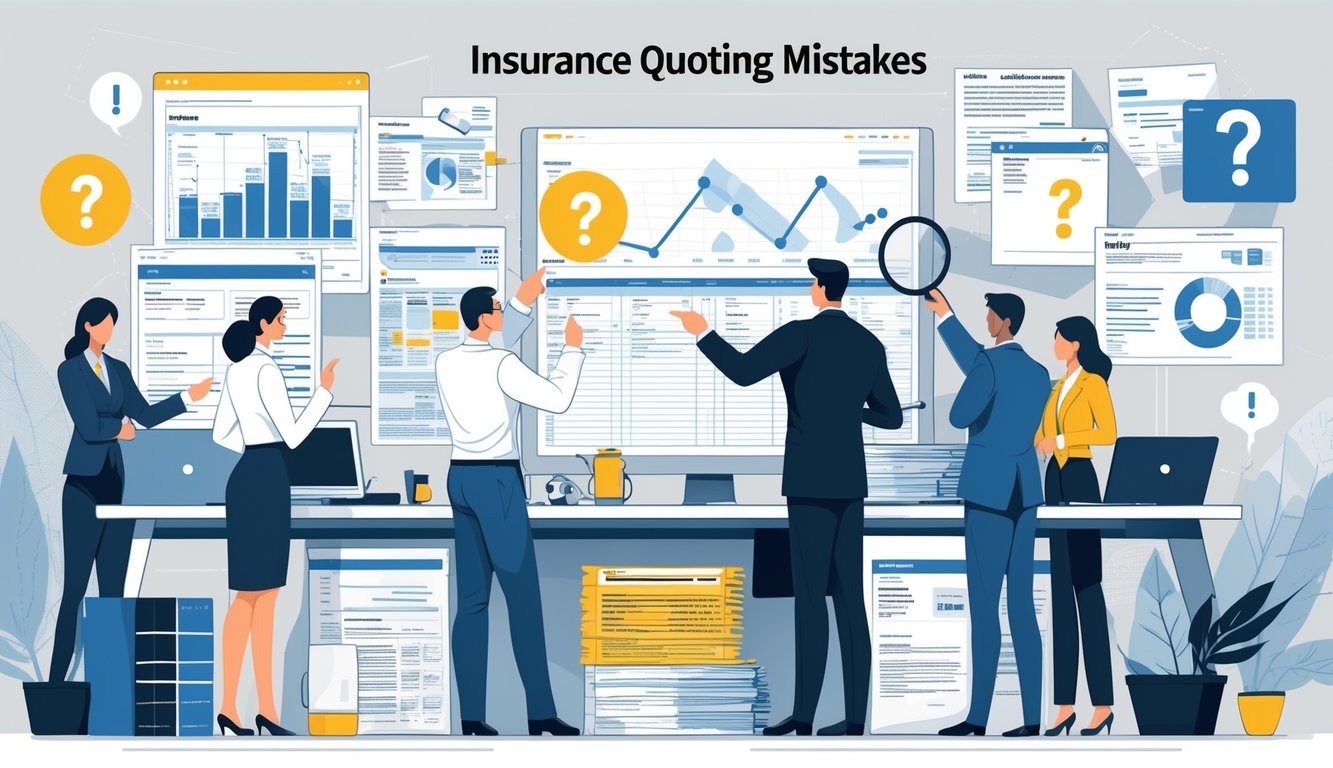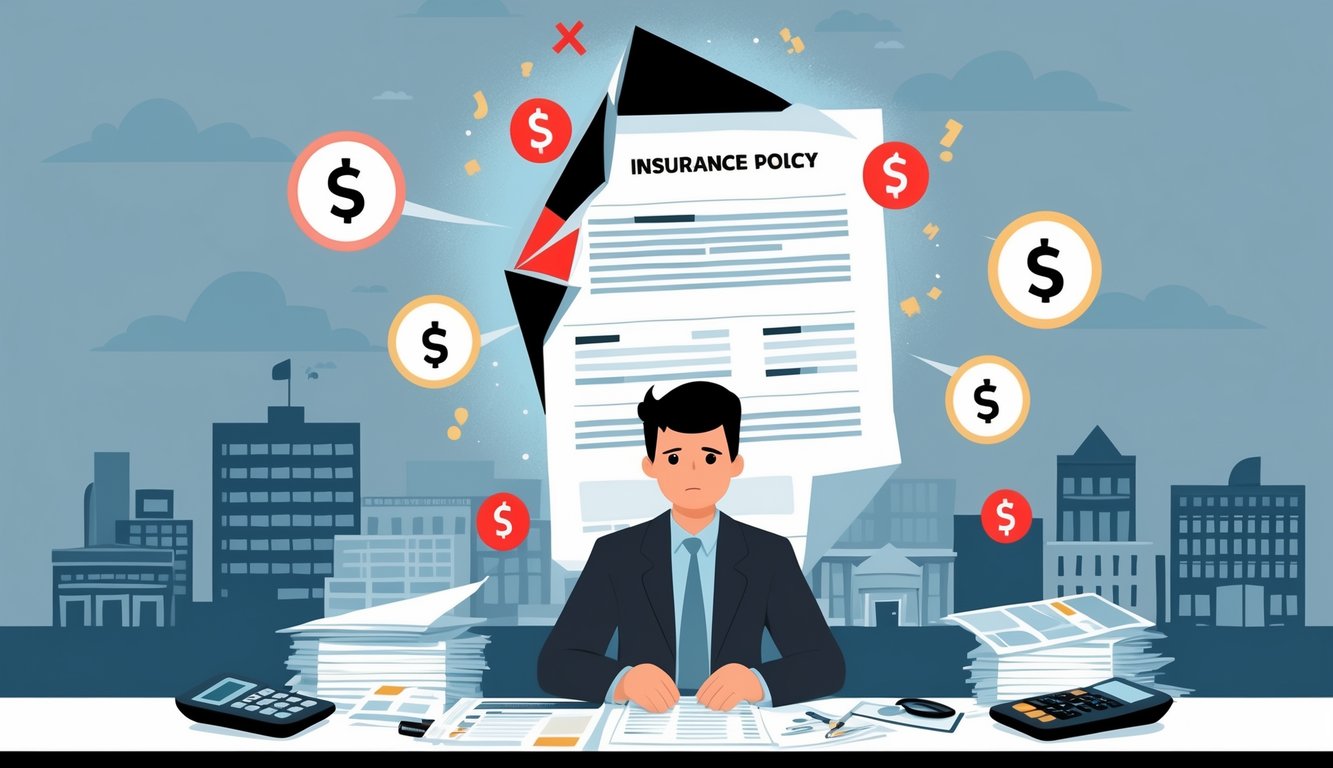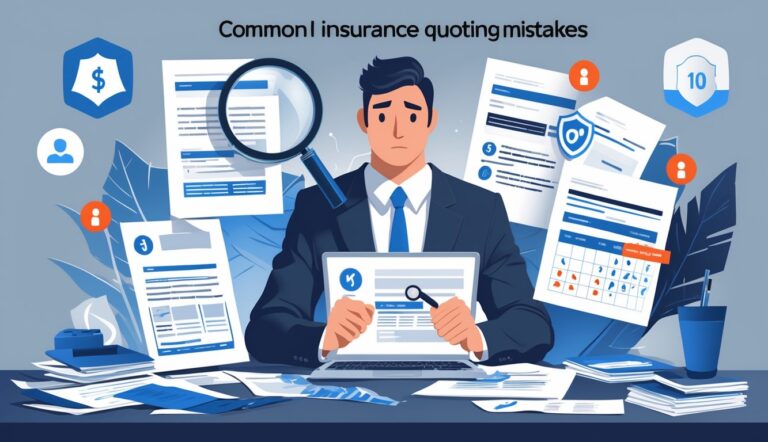Getting an insurance quote feels like it should be simple, right? But even tiny mistakes in the quoting process can leave you with coverage gaps, claim denials, and some nasty, unexpected bills.
A lot of folks rush through insurance applications without realizing how incomplete or wrong information can mess up their coverage. You might not even notice these quoting errors until you file a claim and find out your policy doesn’t cover what you thought.

Construction firms are paying for quoting mistakes they don’t even realize they’re making, and honestly, this issue pops up in all kinds of insurance.
If you underestimate coverage needs or give wrong info about your business or property, you’re piling up financial risks that can bite you later.
Knowing the common quoting mistakes helps you sidestep expensive surprises.
You’ll figure out how to give accurate info, spot coverage gaps, and actually work with agents to get quotes that protect your stuff and your wallet.
Key Takeaways
- Small quoting mistakes can leave you with coverage gaps and denied claims when you need help most.
- If you give incomplete or inaccurate info, you’re setting up long-term financial headaches and mismatched policies.
- Knowing the big quoting errors helps you get the coverage you need and avoid those ugly surprises after a claim.
Most Common Insurance Quoting Mistakes

People usually mess up insurance quotes in three main ways: they guess too low on what it costs to replace things, give wrong details about themselves, or just pick the cheapest option without thinking about what they actually need.
Underestimating Replacement Cost
A lot of us think our homes or stuff are worth less than it costs to replace them today.
Why? Because we use old prices or what we paid years ago, not what it’d cost right now.
Why This Matters:
- Building materials cost way more than five years ago, sometimes 40-60% more.
- Labor isn’t cheap these days, either.
- Your personal stuff might be worth more than you realize.
When you ask for insurance quotes, you’ve got to figure out your replacement cost, not just what you paid.
That means thinking about what it’d cost to rebuild your house or buy new versions of your things today.
For your house, ignore what you paid or even its current market value.
Focus on what it’d cost to build from scratch in your area.
A home you bought for $200,000 might cost $300,000 to rebuild now.
People usually miss these:
- Kitchen appliances and cabinets
- Flooring and fixtures
- Electronics and furniture
- Tools and equipment
Lots of homeowners get tripped up by the 80% rule, which says you need to insure your home for at least 80% of its replacement cost or risk paying out of pocket.
Providing Inaccurate Personal Information
If you give wrong info on your application, your coverage could get voided or your claims denied.
Insurance companies base quotes on what you tell them, so getting it right matters.
Double-Check These:
- Your driving record and violations
- Previous insurance claims
- Property details and square footage
- Business activities or side gigs
Even small mistakes can mess you up.
If you say your home is 1,500 square feet but it’s really 2,000, you’re underinsured.
Car insurance apps want exact details about your car, how you drive, and how much you drive.
If you say you drive 5,000 miles a year but actually do 15,000, you could get your claim denied.
Don’t Forget Address Changes: Where you live changes your rates.
Moving just a few miles can add or subtract hundreds from your premiums.
Don’t just guess at the details.
Take a few minutes to check your home’s square footage, look up your driving record, and make sure all your info is spot-on.
Choosing Coverage Based on Price Alone
Going for the cheapest quote usually leaves you under-protected when things go wrong.
Low premiums usually mean higher deductibles, lower limits, or missing coverage.
Cheap Policies Usually Skip:
- Good liability limits
- Comprehensive options
- Replacement cost coverage
- Protection for valuable stuff
Construction firms make quoting mistakes by focusing only on premiums and ignoring actual risks.
Look at the details, not just the price.
A policy that’s $100 cheaper each month could have a $5,000 bigger deductible.
You might save now but pay way more during a claim.
Compare These:
- Deductibles
- Coverage limits
- Exclusions and restrictions
- Customer service ratings
For car insurance, the cheapest plan might skip rental car coverage or have barely any medical payments.
Those gaps can cost you big if you’re in an accident.
Think about what you can actually afford.
If a $2,500 deductible would wreck your budget, don’t pick that plan just because the monthly payment is lower.
How Quoting Errors Impact Your Insurance and Finances

When you make mistakes on insurance quotes, the financial fallout can be rough and stick around for a long time.
You probably won’t notice these errors until you file a claim, and by then it’s too late.
Denied or Reduced Insurance Claim Payouts
Insurance companies usually deny claims outright when they spot errors in your original quote.
That happens if your real risk doesn’t match what you put down.
This can happen if:
- You misrepresent property values and end up underinsured
- You list your business wrong, so there are coverage gaps
- You give inaccurate personal info, voiding your policy
Construction firms run into big problems when policies have incomplete details or the wrong insured names.
Claims can get denied completely.
Sometimes, insurers don’t deny your claim, but they pay you less.
If you lowballed your property’s value, you’ll only get partial compensation.
That means you’re covering the rest out of pocket.
Unexpected Out-of-Pocket Expenses
Quoting mistakes can hit your wallet hard, usually when you’re already dealing with an emergency.
These surprise costs show up just when you need help most.
Big unexpected costs:
- Higher deductibles than you thought you had
- Coverage gaps that leave you paying for damages you thought were covered
- Premium corrections where you suddenly owe more money
You might find out your deductible is $2,500 when you thought it was $1,000.
Or maybe water damage isn’t covered, and now you owe $15,000 for repairs.
Sometimes, insurers fix your premium after finding quoting errors, and you get hit with a big bill for what you actually owed.
Long-Term Effects on Personal Finance
Quoting errors can mess with your finances for years.
The trouble doesn’t always end after one claim.
Long-term issues:
- Credit score drops from unpaid bills or damages
- Less borrowing power from new debt
- Higher future premiums because of your claims history or policy cancellations
If your claim gets denied because of quoting errors, you’re stuck with the whole bill.
Medical bills or storm damage can add up fast.
You might have to use credit cards or loans with high interest.
If you can’t pay, your credit score takes a hit, making future loans more expensive.
Insurance companies remember your claims history.
Even denied claims can make it harder to get affordable coverage later.
Frequently Asked Questions

Insurance quoting mistakes can cost you through higher premiums, not enough coverage, or claim denials.
If you know how application errors and misunderstandings affect your quotes, you’ll make smarter insurance choices.
How can inaccuracies in application information lead to incorrect insurance quotes?
When you give wrong info on your application, insurance companies use it to calculate your quote.
That means your premium is based on details that might not be true.
If you lie or mess up your driving record, your auto quote will be too low.
The insurer finds out during underwriting and bumps your rate up.
Property details like square footage, age, and what it’s made of all affect your homeowners quote.
If you underestimate, you get a low quote that jumps up when the policy starts.
Business insurance quotes can swing a lot if you get employee numbers, revenue, or your industry wrong.
You might end up with a policy that doesn’t fit your real needs.
What are the implications of not comparing insurance quotes from different providers?
If you don’t compare quotes from several insurers, you’ll probably pay more than you should. Small business insurance averages $57 a month, but prices can be all over the place.
Different companies use their own rating factors and offer different discounts.
One might be better for your age, while another gives you a deal for safety features.
You also miss out on coverage options that might fit you better.
Some insurers have special policies or features others don’t.
If you only look at price, you might end up with coverage that doesn’t actually protect you.
In what ways can misunderstanding coverage options affect my insurance quote?
If you don’t really get the coverage options, your quote won’t match what you need.
You could pick limits that are too high or too low.
Mixing up liability limits and deductibles changes your quote.
Higher liability costs more, higher deductibles cost less.
Not knowing the difference between actual cash value and replacement cost can mess up your property quote.
Replacement cost is pricier but covers you better.
If you don’t know about bundling, you might pay more.
For example, a business owner’s policy usually costs less than buying liability and property coverage separately.
Why is it important to update personal information when seeking a new insurance quote?
If your personal info is old, your quote won’t match your real risk.
Life changes, and so do your insurance needs.
Moving to a new zip code can raise or lower your premiums a lot, depending on local crime or weather.
Your credit score matters for insurance rates in most states.
If it goes up, your premiums can drop.
If it goes down, you’ll pay more.
Getting married or divorced also changes your needs and rates.
Sometimes you get new discounts or need more coverage.
How can neglecting to read the fine print of a policy affect insurance costs?
If you skip the fine print, you might get hit with surprise costs when you file a claim.
There could be exclusions or limits you didn’t notice in the quote.
Hidden fees and policy rules can make your insurance cost more than the quoted premium.
Some policies have admin fees or payment charges.
Not knowing the claims process can mean denied claims or slow payouts.
That makes your coverage pretty useless when you need it.
Renewal terms in the fine print can raise your costs down the road.
Some companies start you off cheap, then raise the rates a lot at renewal.
What are the risks of underestimating the value of assets when obtaining insurance quotes?
If you underestimate what your assets are worth, you end up with coverage limits that just don’t cut it.
When something happens, your insurance payout won’t actually cover what it costs to replace everything.
Lowballing asset values might make your property insurance quotes look cheaper, but that just means you’re left with coverage gaps.
If disaster strikes, you’ll have to pay out of pocket for whatever your policy doesn’t cover.
When businesses undervalue their assets, their commercial insurance quotes and coverage take a hit.
Not having enough coverage for equipment, inventory, or buildings can put the entire business at risk after a loss.
If you don’t insure your assets for their real value, you might get hit with coinsurance penalties.
Insurance companies often reduce claim payments when policyholders don’t keep up with adequate coverage for what they own.






